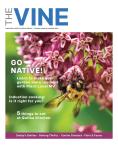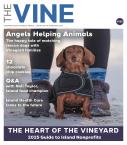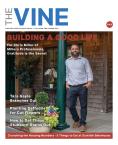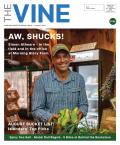Most of us know Island fishermen have had a tough time in recent years — over-fished stocks, complex regulations, quotas. And now, warming waters caused by climate change. But many of us would never guess that becoming a fisherman today can also be extremely expensive, with commercial permits costing tens of thousands, hundreds of thousands or sometimes millions of dollars.
Well, Shelley Edmundson knows. And with her passion, her organizational skills, a PhD in Zoology/Marine Biology, and a talented group of peers to work with as Executive Director of the Martha’s Vineyard Fishermen’s Preservation Trust, she has the zeal and the knowledge to do something about this problem.
While Shelley arrived on the Island seventeen years ago as an import from St. Cloud, Florida, her love for the Vineyard began with summers at her grandmother’s house in Vineyard Haven.
“It was heaven to come here every summer,” she exclaimed. “We would get off the boat, get to my grandparents, and I would run to see if the honeysuckle was still blooming, because we didn’t have any of that in Florida. It was just like a dream world here and it was so much fun! All my cousins were here and we just had the best time exploring the beaches and sailing and going to camps,” she remembers.
Q. Did you leave Florida for college?
A. Yes, that was part of my plan to come up here for good. I went to Wheaton College in Norton, Mass. Once I finished, I came here and lived with my grandmother and was soon commuting to UMass Boston for my master’s degree in environmental science.
Q. What turned you on to the fisherman’s plight?
A. I was very interested in the fisheries here and I first worked with the Dukes County Fishermen’s Association. We would meet, discuss issues. It was a loose group, but I liked being involved.
Q. And what were their concerns?
A. They were trying to gather data on the biology of the different species in Nantucket Sound. They asked me to gather information on the biology of the channeled whelk to see what we could learn about them. So I went off to research and soon found out that there was very little known about channel whelk biology.
Then I discovered that this was our largest fishery on the Island in both volume and value. What?! So I thought, how are we regulating these effectively when we don’t really understand a thing about them?
So that took me on a completely different path and I went off to UNH and got my doctorate studying channeled whelk.
Q. So where did that study lead you?
A. Through my research on channeled whelk, I met more fishermen, I did a lot of research on their boats, and started to understand that not only do we need to have the right and relevant data for the fish and shellfish they’re harvesting, but that they also have other issues that are putting their livelihoods at risk.
Q. Like what?
A. Primarily the cost of permits and the privatization of the industry. If an older fisherman who’s been fishing for years is ready to retire, his permit can cost from $70,000 to millions of dollars depending on the fishery. So if a younger fisherman who has been working on his boat is ready for the next step, that’s way too huge a jump!
All of a sudden I understood the urgency of the risks that were piling up. If we didn’t do something, we would lose our family fishermen and the harbors and working waterfronts that make the Vineyard what the Vineyard is.
Q. So how did all this lead to the MV Fishermen’s Preservation Trust?
A. My friend, Wes Brighton, a fisherman, had heard of groups like this across the country. He said we needed to start one here — a permit bank — where we could help fishermen hold on to their access to fish. We then pulled in John Keene and Warren Doty, and we all formed this organization. We weren’t quite sure how it would take shape, but we knew we had to do something.
Q. So what are you doing?
A. To put it simply, we help our commercial fishermen continue to fish on the Island.
Right now we have a few established programs that are working quite well. One helps our sea scallop fishermen by leasing them sea scallop quota at a subsidized rate. And another helps lobster fishermen. Every trap needs a tag. The tags are sold in lots of 300 and they’re expensive. With creative financing, we provide them to local lobstermen in smaller quantities that they can afford.
Q. You mentioned privatization of the fishing industry. Meaning?
A. Who can afford these permits? Big companies!
For many permits, like for sea scallop quota, you don’t have to be a fisherman. You can be a hedge fund and own scallop quota that you lease to fishermen. And you can charge the price you want. You are influencing a whole fishery and many livelihoods — and you are making money without even leaving your chair.
Q. What other roles do you take on with the Trust?
A. I communicate with the fishermen and the regulators. There’s a lot of conflict. But finding opportunities where both can come together to discuss issues is one thing we do.
Also I advocate — act as a voice for the fishermen, conveying their concerns — so people know why they are worried or what’s wrong, in terms of rules or regulations or whatever.
In my mind, everybody needs to be collaborating for our fisheries to exist. If it becomes based just on what you can afford and corporations take over the resource, then it gets really scary because we could be left as an island, surrounded by water, with not a single local fisherman able to go out because they can’t afford to compete.
Q. What do you love about this work?
A. I love fishermen. I think they’re underappreciated and that they are amazingly skilled people who should be respected more. They have to be so many things: They have to think like a marine biologist, to know how fish feed and move, to be a mechanic, to be their own doctor on the boat if something happens … they just really have to be ready for anything. They take on so much risk for us and we just see the product on the shelf. I feel lucky to be able to know these people.
Q. It looks like you see your extended future right here!
A. Yes! I would feel that I was letting people in our community down if we didn’t keep trying to get these people fishing. I feel so connected here. Finding a way that I can be useful to the community and the natural environment that I love feels very rewarding.
Paula Lyons is a former ABC and CBS television consumer journalist. She lives in Vineyard Haven.




 5 comments
5 comments





Comments (5)
Comments